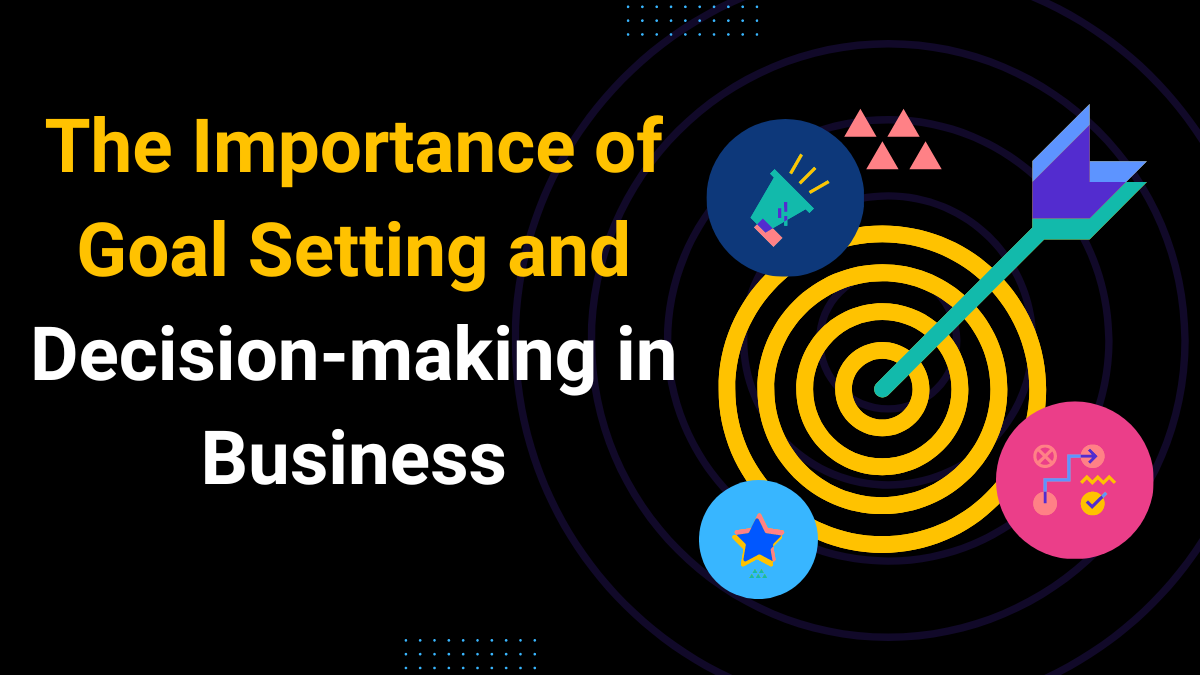Introduction
In the intricate dance of business, The Importance of Goal Setting and decision-making emerge as the guiding stars that illuminate the path to success. This comprehensive guide delves into the symbiotic relationship between these two pillars, exploring how their integration forms the bedrock of a resilient and thriving business strategy.
Table of Contents
Understanding the Significance of Goal Setting
The Importance of Goal Setting transcends mere aspiration; it lays the foundation for strategic direction and purposeful action. Here’s why it matters:

Clarity and Concentration
In the tumult of the business landscape, clear goals serve as beacons, guiding organizations through uncertainty. By defining precise objectives, businesses maintain unwavering focus, channeling efforts towards meaningful outcomes amidst distractions and challenges.
Motivation Booster
Goals inject vitality into organizational endeavors, fueling a sense of purpose and drive among team members. Whether pursuing ambitious growth targets or striving for operational excellence, well-defined goals inspire commitment and resilience, propelling businesses towards success.
Progress Tracking
Breaking down lofty aspirations into manageable milestones enables organizations to track progress effectively. These checkpoints serve as indicators of success, allowing for course corrections and strategic realignment as needed. By embracing an iterative approach to goal pursuit, businesses foster a culture of continuous improvement and achievement.
Team Alignment
Inclusive The Importance of Goal Setting fosters unity and collaboration within teams, aligning individual efforts with collective aspirations. By involving employees in the goal-setting process and clarifying their roles in achieving objectives, businesses cultivate a shared sense of purpose and accountability, driving synergy and productivity across the organization.
The Art of Making Decisions
Effective decision-making is the linchpin of organizational agility and resilience. Here’s why it’s indispensable:
Speed and Agility
In today’s fast-paced business environment, agility is paramount. The ability to make swift, well-informed decisions confers a competitive advantage, enabling organizations to capitalize on fleeting opportunities and navigate turbulent market dynamics with finesse.
Risk Management
Every decision entails inherent risks, but informed choices mitigate uncertainty and maximize potential rewards. By conducting rigorous risk assessments and weighing options judiciously, businesses can navigate complexity with confidence, minimizing pitfalls and optimizing outcomes.
Adaptability
Business landscapes are perpetually evolving, demanding a nimble approach to decision-making. By embracing change and seizing emerging opportunities, organizations position themselves for long-term success, remaining resilient amidst shifting market paradigms and technological disruptions.
Building Trust
Transparent, decisive decision-making fosters trust and credibility within organizations. By communicating decision-making processes openly and soliciting feedback from stakeholders, businesses cultivate a culture of accountability and collaboration, strengthening relationships and fostering loyalty among employees, customers, and partners.
Integrating Goal Setting and Decision-Making: Maximizing the Importance of Goal Setting for Business Success
The seamless integration of The Importance of Goal Setting and decision-making is where the magic truly happens in the realm of business. Let’s explore how these two pillars intertwine to propel organizations towards success:

Building Trust
Aligning decision-making processes with overarching goals ensures that every choice made contributes to the realization of the company’s vision. By anchoring decisions in strategic objectives, businesses maintain coherence and consistency in their endeavors, maximizing the impact of their actions on organizational performance and competitiveness.
Data-Driven Insights
Effective decision-making relies on accurate and timely data. By harnessing the power of data analytics to inform strategic choices, businesses gain valuable insights into market trends, consumer behavior, and competitive dynamics, empowering decision-makers to make informed judgments that drive sustainable growth and profitability.
Agile Planning and Execution
In today’s dynamic business landscape, agility is key to survival. By coupling goal setting with agile decision-making processes, organizations can adapt swiftly to changing circumstances, seizing opportunities and mitigating risks in real-time. This iterative approach to planning and execution enables businesses to stay ahead of the curve, responding proactively to market shifts and emerging trends.
Resource Optimization
Effective resource allocation is a critical aspect of both The Importance of Goal Settingand decision-making. By prioritizing goals and optimizing resource allocation accordingly, organizations ensure that limited resources are deployed to high-impact initiatives, maximizing efficiency and ROI. This strategic allocation of resources enables businesses to achieve more with less, driving sustainable growth and profitability over the long term.
Stakeholder Engagement
Successful The Importance of Goal Setting and decision-making require buy-in from all stakeholders, both internal and external. By fostering open communication and collaboration, businesses can align stakeholders around shared objectives, harnessing collective expertise and resources to achieve common goals. This inclusive approach fosters a sense of ownership and accountability, driving organizational success and stakeholder satisfaction.
Continuous Improvement
The integration of The Importance of Goal Setting and decision-making is an ongoing journey of refinement and evolution. By regularly reviewing and fine-tuning goals and decision-making processes, organizations can adapt to changing market dynamics and emerging opportunities, ensuring relevance and resilience in the face of uncertainty. This commitment to continuous improvement enables businesses to stay agile and innovative, driving sustained growth and competitive advantage in the marketplace.
If you love personal development and self-awareness, you can check our Website for useful information
Conclusion
In the dynamic and competitive landscape of business, the synergy betweenThe Importance of Goal Setting and decision-making is the key to unlocking growth and success. By integrating these two pillars into a cohesive and strategic framework, organizations can navigate complexity with confidence, realizing their full potential and achieving enduring success in the marketplace. Embracing this integrated approach empowers businesses to thrive in an ever-changing world, driving innovation, and delivering value to stakeholders across the board.
This comprehensive exploration underscores the transformative power of integrating The Importance of Goal Setting and decision-making, offering actionable insights for businesses seeking to elevate their performance and achieve sustainable growth in today’s rapidly evolving business environment. By embracing the synergy between these two pillars, organizations can chart a course towards success, realizing their strategic objectives, and maximizing their impact on the world.

